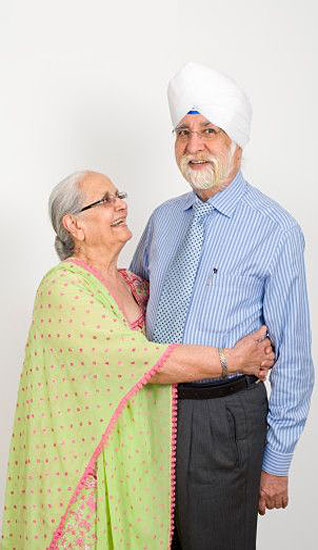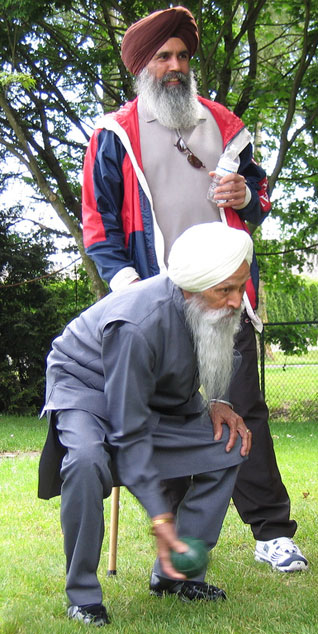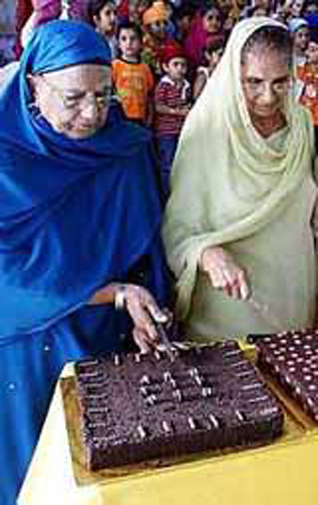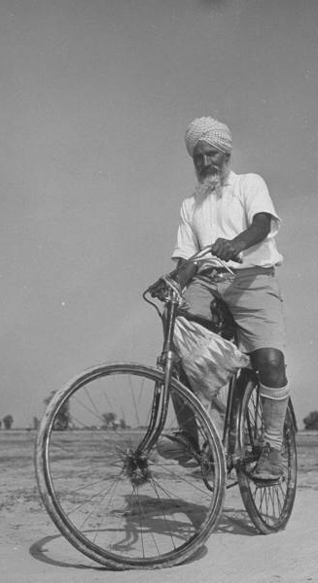Roundtable
Is Old Age A Disease?
The Roundtable Open Forum # 89
by T. SHER SINGH
We, as human beings, claim superiority in the animal kingdom and cite human sociability and the ability to achieve progress as the bases.
There is at least one more significant distinction, but I am not sure if it is indicative of any superiority.
We are sanctimonious.
It is one trait that sets us completely apart from the rest of creation (including computers).
We explain. We justify. We philosophize. We weigh the pros and cons. We look at the options. We study the implications and the ramifications. We then pretend to make decisions as if we are in control of our destiny. Or ever have been.
Human progress is careening down the hill with the speed of a runaway locomotive. But we convince ourselves that it has all been planned … by us! It’s nothing unusual, we reassure ourselves; we can stop it anytime we want to stop it. If we want to stop it.
Our sanctimony was most visible when, a few years ago, the debate over reproductive technologies was once again brought to the forefront by the report on a 59-year old woman who had given birth to twins with help of the in vitro procedure.
My immediate reaction was identical to that of most others: surely, this is an abuse of technology! This is playing God!
And on a 59-year old woman?
Is she crazy? Have the doctors and scientists gone berserk?
Poor children. What kind of life do they have in wait for them?
Even though I have withdrawn from my initial knee-jerk reaction, having given it some more thought, I’m still not sure whether it is right or wrong, good or bad, beneficial or harmful.
Or whether this time we have gone too far.
But I am alarmed by our collective hypocrisy, expressed through pretentious discussions of ethical issues that seem to hover over the story.
Abuse of technology? Playing God? Interfering with nature?
Don’t we interfere with nature every time we take aspirin? Or when we involve a health care team in the timeless act of ordinary childbirth? When we heat our homes … or air-condition them?
How did we determine which interferences are ethical and which constitute cavorting with the devil?
In fact I remember my grandfather telling me of the hue and cry when electricity and the light bulb were first introduced in his village. They - yes, “THEY” - said it was interference with nature.
The brouhaha that ensued merely reflected what had already gone on only a few years earlier in the West, where the Bible was quoted freely, especially against the “works of Satan.“
My father remembered an identical hullabaloo when the gas stove and the fan, and later the refrigerator, came into the market.
Even I remember … and I ain’t Rip van Winkle, yet! - the prolonged raising of the eyebrows upon the introduction of air-conditioning.
I am not suggesting that all new technology must be presumed either good or bad - any blind presumption could prove troublesome.
The question is: What are the criteria? And who applies them? How? When?
The focus on the woman’s age - 59 - also raises some concerns. She will be 79 by the time the children are 20, say many. Where will she get the energy required for child-rearing? What if she dies - who will look after the children?
Good questions.
But odd, nevertheless, because I’ve never heard them being asked about any other group. Criminals are allowed to have children - the state imposes no restrictions on those awaiting trials involving life sentences.
The extreme poor, the obscene rich, the obsessive busy, the pathetic incompetent, the shameless dishonest, the not-so-bright, the career-preoccupied, the perennially sick - (nothing should be inferred from my bunching them all together, please!) - have never been questioned for their ability to raise children properly. Parenting is the only area that goes unscrutinized.
Yet we refer to the 59-year old mother with disgust.
Is old age a disease?
Does one become increasingly incompetent as one gets older? Is 59 the death knell for competence, especially in the art and science of raising children?
I thought that experts worth their mettle have actually concluded the opposite. That many of our children suffer from the young, untrained parent. That the current generation of children suffers from the absence of meaningful contact with older people.
I personally don’t know of too many kids who don’t benefit immensely from the involvement of old grandparents in their upbringing. Many of them have been brought up by such grandparents through the voluntary choice of the parents. And are all the better for it, in everybody’s opinion.
Once again, are we jumping to conclusions based on ingrained prejudices? Somehow, we have deluded ourselves into believing that the epitome of human excellence can be measured by the jogging abilities of men and women. And the ability to remain wrinkle-free.
It is a marked departure from the time, not too long ago, when wisdom was the measure. And when it was recognized that wisdom was acquired only through actual living - through experience and the development of a personal spirituality and ethos - not through aerobics.
And not through amassing umpteen apps on your toys and distractions.
In searching for answers to questions on life, we must first decide who will be our guides - the fitness instructors or the old and wise amongst us.
[For those of you are curious, the earliest version of this piece was published when I was 44 years old.]
THE ROUNDTABLE OPEN FORUM # 89
What are your thoughts on the ageing process?
Are we making full use of our seniors and the wisdom they have accumulated through their lifetimes?
Or is society today squandering it all while focusing on prolonging youth ... or the semblance of it?
CAVEAT: The focus of this piece is not on whether a 59-year old should or should not bear children ... it's merely offered as an illustration of our prejudices around "ageism". So, let's not get stuck on that non-issue in this discussion.
March 16, 2012
Conversation about this article
1: Baldev Singh (Bradford, United Kingdom), March 16, 2012, 11:40 AM.
Old Age is certainly not a disease. The disease is ageism. Like any prejudice and discrimination, it is destructive to the core!. We all age and die, as sure as taxes. It is the only certainty in life! In the U.K. press over the last several days, we have seen the disturbing neglect and abuse of elderly people in senior-care homes, so this article is very timely ... and extremely appropriate.
2: Sunny Grewal (Abbotsford, British Columbia, Canada), March 16, 2012, 3:46 PM.
Baba Deep Singh. Enough said.
3: Sangat Singh (Kuala Lumpur, Malaysia), March 17, 2012, 8:39 AM.
At no point, no matter how old one is, very few are prepared to make an egress willingly. This very old sickly woodcutter carrying a heavy load finally sat down and prayed: "God, it's enough misery, call me home!" and suddenly Yamraj appeared. "Okay, your prayer is answered and it is time to go." "No, no, I was just joking, would you please help me put the load back on my head? I should be on the way and it is getting rather late."
4: Mohan Singh (Toronto, Ontario, Canada.), March 18, 2012, 11:50 AM.
Guru Arjan: "Disease, sorrow, pain, old age, death ... nothing threatens the humble servant of the Lord [GGS:711].
5: Manjeet Shergill (Singapore), March 21, 2012, 2:33 AM.
Old age sucks. Any age sucks when one is not able to be in love with life, with a boy, with a girl, with a dog or anything life gives. The chemistry of the human brain at any age changes when there is an opportunity to love and be loved.
6: Nekkocite (Miami, Florida), March 31, 2013, 3:54 AM.
Death as sure as taxes ... I hate that saying. Both of those things are an inevitability only when viewed from within the system that they function. Both are growingly archaic realities ... an ear of post scarcity will soon be upon a global society which will slowly distort not only the absoluteness of each but the necessity as well ... It is clear, scientifically speaking, that aging (not ageism ... let's face it, in a youth driven, capitalist and consumer culture, age does not belong) past one's prime only happens because we cannot control the amount of erosion that is happening to our cells ... cells that are, with maintained telomeres and exposure to water, basically already immortal. You can accept death as a reality if you want ... but it seems foolish when we are given the keys and the dream / desire to bypass it ... by the same logic, we would never have left the bush or hunted for fish ... and the universe would be one less percentage (assuming we are the only intelligent life in it) aware of its existence.
7: Shamsher Singh (Sydney, Australia), March 30, 2015, 10:56 PM.
Old age is not a disease. An article written by Robert Kemp in 1962 in 'The Lancet journal' was one of those early attempts made by some doctors to bring awareness to this matter. No doubt old age is what will lead us to death (unless, of course, we die before attaining that age due to some other reason). Just like other phases of our life, old age is a stage of life. It has been said, "Youth is a blunder, manhood a struggle, old age a regret". However, we all age differently, some fit and healthy while others with morbid conditions and on multiple medications. There exists a tremendous heterogeneity in health profiles, social status, and economic aspects. Homogenizing (one size fit all theory) onto all aged individuals is wrong.






